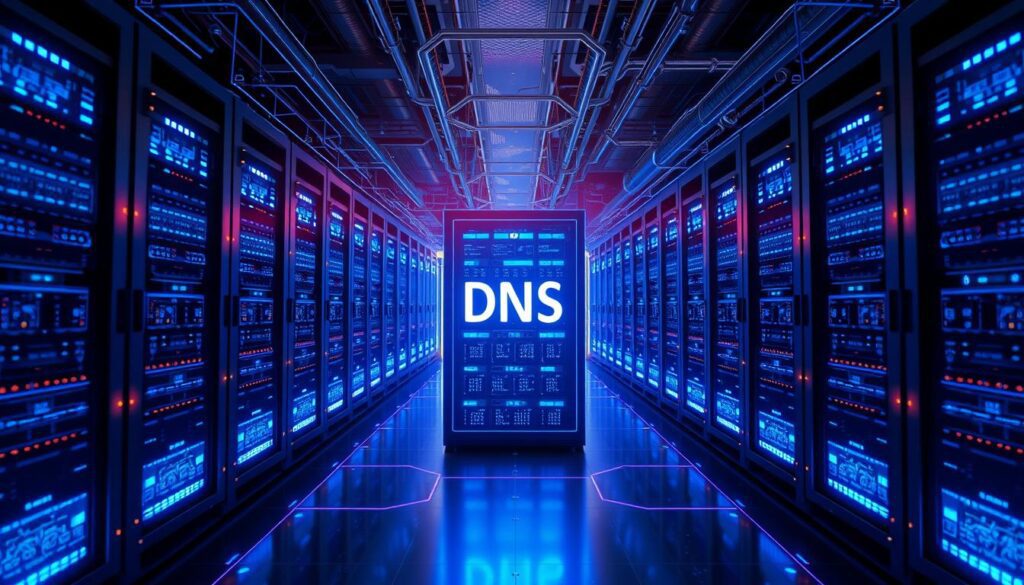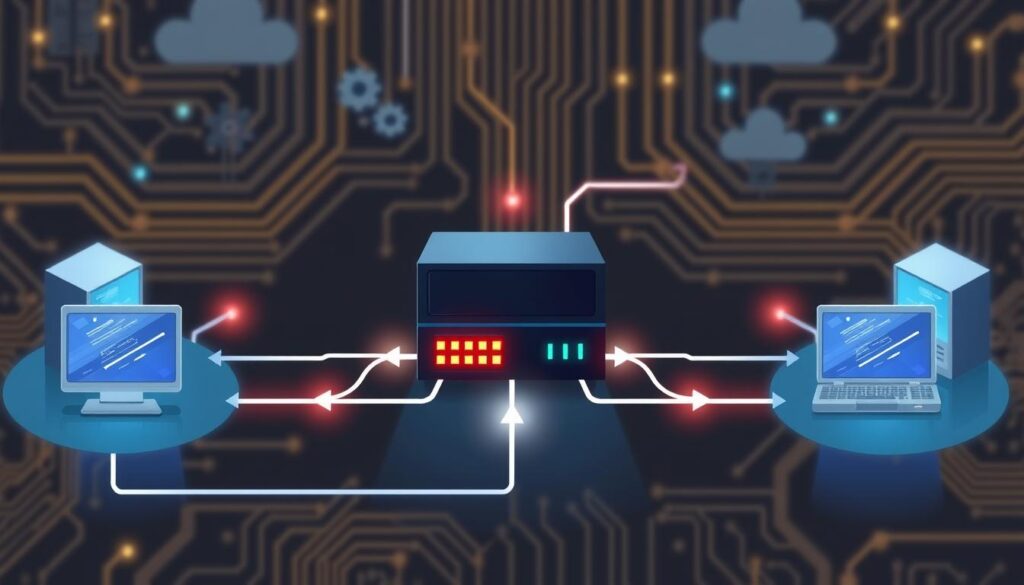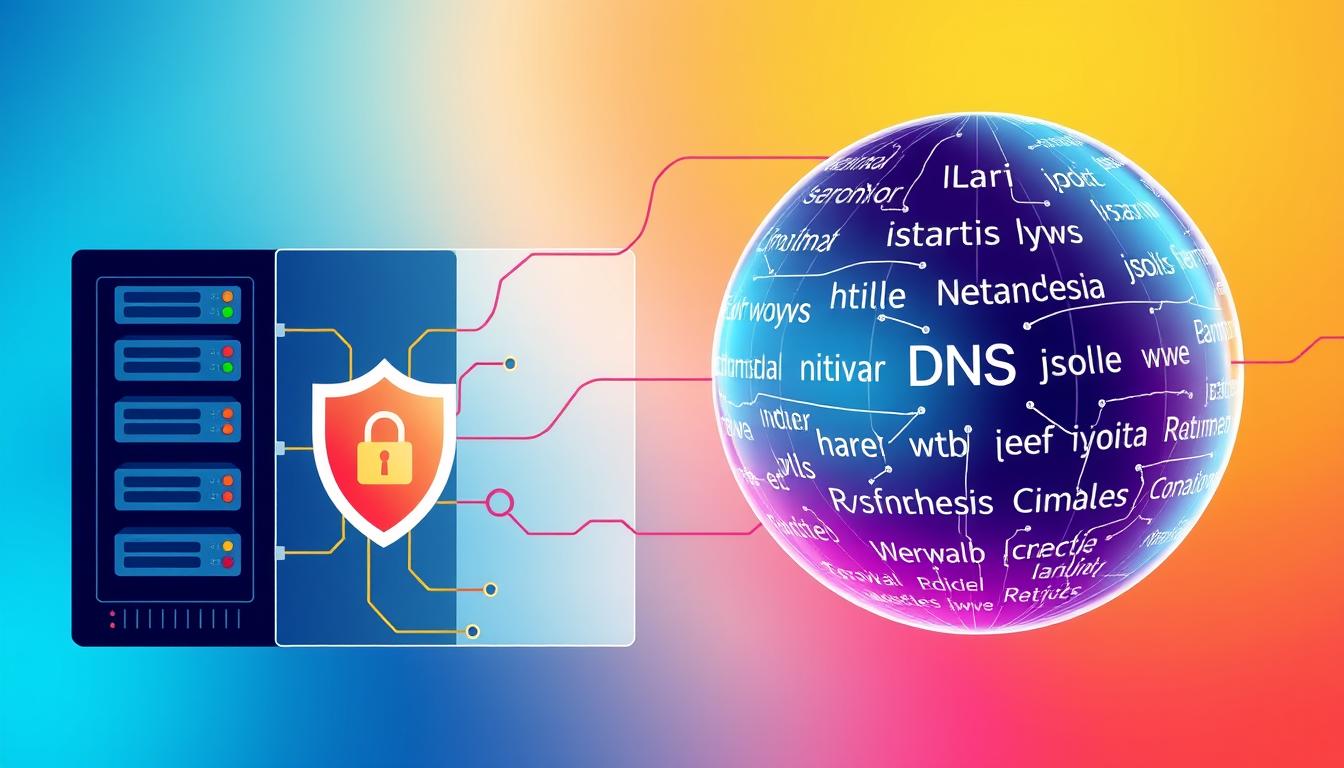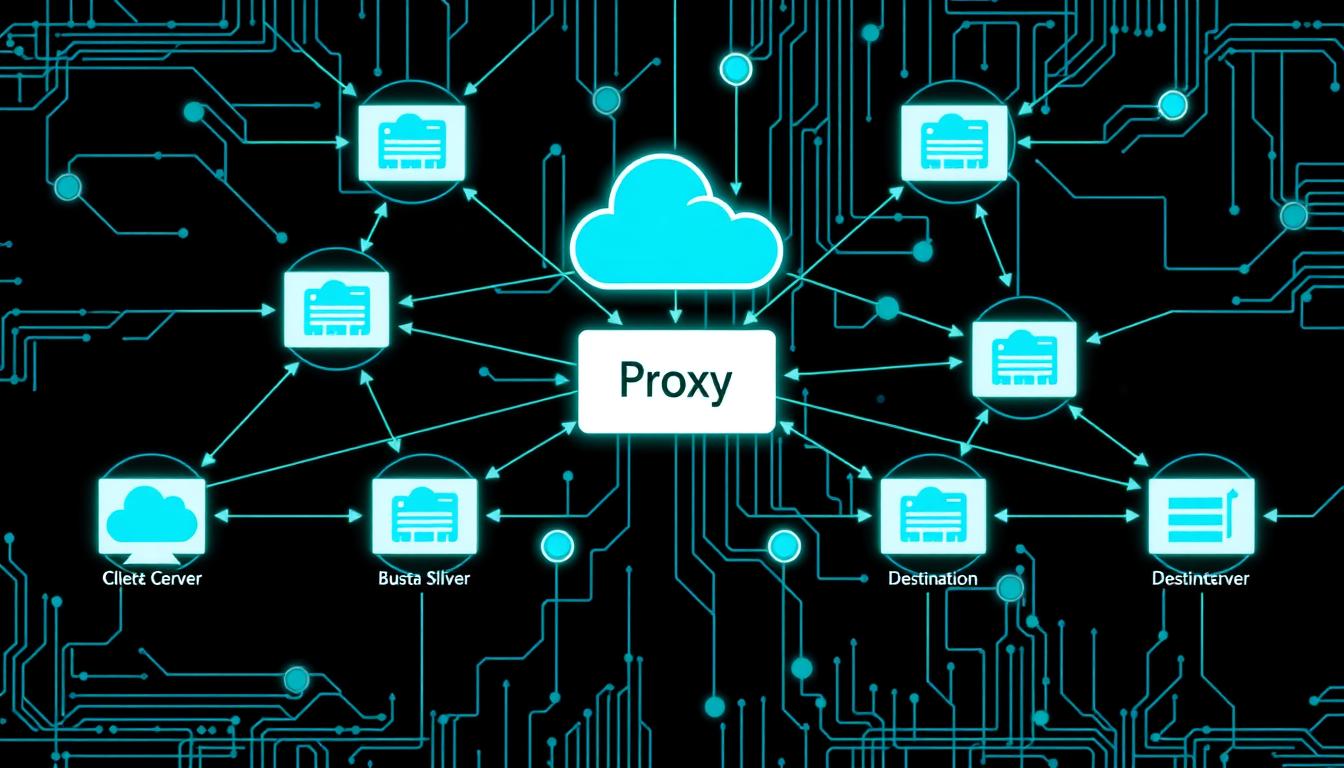Proxy vs DNS: What’s the Difference? As I explore online security and anonymity, I often ask: what makes a proxy different from a DNS? How do these differences change my online experience? With more people using online proxy servers and DNS services, it’s key to know their roles in internet access and security.
Whether you’re using a free proxy or an anonymous proxy site, understanding the difference is crucial. It greatly impacts your online privacy and security.
In my research on proxy vs DNS, I’ve found services like Azure Firewall DNS Proxy and Azure DNS Private Resolver. They offer features like centralized DNS forwarding and caching. But how do these features affect my online experience? How do they compare to using a proxy server or a free proxy site?
Key Takeaways
- Proxy servers and DNS services serve distinct purposes in facilitating internet access and ensuring online security.
- Azure Firewall DNS Proxy and Azure DNS Private Resolver offer features such as centralized DNS forwarding and conditional forwarding.
- Proxy servers can provide anonymity and bypass geo-restrictions, while DNS services focus on domain name resolution and caching.
- DNS caching can enhance performance, but specific percentage improvements are not stated.
- Split DNS proxy configurations can improve security and efficiency by separating corporate and public domain queries.
- Dynamic DNS (DDNS) functionality allows for dynamic updates of IP addresses for registered domain names.
Understanding the Basics of Proxy and DNS
Exploring online security and privacy, I find proxy servers and DNS crucial. A proxy server sits between my device and the internet. It lets me visit websites and services while keeping my IP address hidden. DNS, or Domain Name System, turns domain names into IP addresses. This makes it easier to visit websites using names instead of numbers.
I can boost my online security with a proxy service. There are many types of proxy servers, like anonymous ones. These help keep my online identity hidden. When picking a proxy, it’s important to choose a good DNS service for fast and reliable connections.
When picking a proxy server, look for key features. These include bypassing geo-restrictions, accessing blocked sites, and protecting my identity. A good proxy website should offer a fast, reliable connection and strong encryption. Knowing about proxy servers and DNS helps me make better choices for my online safety.
Here are some benefits of using a proxy server:
- Enhanced online security and privacy
- Access to blocked websites and geo-restricted content
- Protection from online threats and malware
- Fast and reliable connection
How Proxy Servers Transform Your Internet Experience
Exploring proxy servers has changed how I use the internet. A proxy server acts as a middleman, hiding my IP address. This makes it hard for websites to know where I am. It’s great for seeing geo-restricted content that’s not available in my area. With a proxy ip address, I can surf the web more freely and privately.
Using a free proxy server offers many perks. It boosts security and can make the internet faster. It encrypts my web requests, cutting down data breach risks by up to 60%. Also, it can speed up my internet by 30-50% by caching content and using less bandwidth.
Key benefits of proxy servers include:
- Access to geo-restricted content
- Enhanced online security through encryption
- Improved internet speed through caching and reduced bandwidth consumption
- Anonymity and privacy through hidden IP addresses
Proxy servers also work well with DNS server services. This combo can make my internet faster and get around location blocks. Using a public dns service like Google DNS or Cloudflare DNS makes my online experience better. With the right setup, I can explore more online safely and efficiently.
| Proxy Server Benefits | Description |
|---|---|
| Access to Geo-Restricted Content | Proxy servers can hide IP addresses, allowing access to content restricted by location |
| Enhanced Online Security | Proxy servers can encrypt web requests, reducing the risk of data breaches |
| Improved Internet Speed | Proxy servers can cache frequently requested content, reducing bandwidth consumption and improving loading times |
The Critical Role of DNS in Web Navigation

DNS is key in making websites accessible. It changes domain names into IP addresses. This lets users visit sites with easy-to-remember names instead of hard-to-remember numbers. A DNS server handles these requests, affecting how fast websites load.
A dns resolver does the dns lookup work. It asks dns servers to find the IP address for a domain name. Using smart dns can make this process faster and more reliable. Having the right dns configuration and dns settings is also important for smooth dns resolution.
DNS Resolution Process
The dns resolution process involves several steps. It starts with a local cache, then a dns resolver, and ends with dns servers. This complex process is crucial for quick and efficient web access. Knowing how it works and optimizing settings can enhance your browsing experience.
Types of DNS Servers
There are different dns servers, like recursive and authoritative ones. Each type has a vital role in the dns resolution process. Understanding their functions helps in improving dns configuration and dns settings.
| Type of DNS Server | Function |
|---|---|
| Recursive DNS Server | Resolves domain names into IP addresses using a recursive query process |
| Authoritative DNS Server | Provides the final answer to a DNS query, returning the IP address associated with a domain name |
Privacy and Security Features Compared

Online privacy and security are key concerns. Both proxy and DNS have their own benefits and drawbacks. A secure dns offers a safer and more private way to browse the web. On the other hand, a proxy service adds an extra layer of security and anonymity.
An anonymous proxy server can hide your IP address. This makes it harder for others to track your online activities.
A proxy website is great for getting around geo-restrictions and accessing blocked content. But, picking a best dns service that focuses on network security is crucial. Look for services with encryption and secure protocols. AdGuard DNS and Cloudflare DNS are good choices for their strong security and fast speeds.
To keep your online activities safe, use a proxy service and a dns service from the same provider. This prevents DNS leaks and keeps your browsing private. By choosing a trusted provider and setting up your services right, you can have a secure and private web experience.
Speed and Performance: Proxy vs DNS

Both proxy servers and DNS servers are key for speed and performance. A proxy server can make network traffic better and cut down on delays. Fast DNS services also help websites load faster and more reliably. Setting up your proxy server configuration right is crucial for the best results.
Anonymous proxies can make it easier to get to blocked content quickly. At the same time, reliable DNS providers make sure DNS queries are answered fast. For instance, proxy servers help get around geo-blocks. And DNS servers offer quicker and more stable website access.
Here are some important things to think about when looking at proxy vs DNS server speed and performance:
- Latency: The time it takes for a request to be sent and a response to be received.
- Bandwidth: The amount of data that can be transferred per unit of time.
- Geographic location: The server’s distance from the user can affect how well it works.
In summary, the speed and performance of proxy vs DNS servers are vital for a good online experience. Knowing what affects performance and setting up your proxy server configuration right can help you get fast and reliable internet access.
When to Use a Proxy vs DNS Services

Choosing between a proxy server and DNS services can be tough. A proxy server is great for getting around content blocks. On the other hand, DNS services are best for making websites load faster.
Proxy servers act as a shield, keeping your data safe from threats online. DNS services, on the other hand, help you find websites quickly. Think about what you need: if it’s about getting past content blocks, go for a proxy server. But if you want websites to load faster, DNS services are your best bet.
For example, a free proxy can help you access blocked content. Or, you might prefer a public DNS for a smoother browsing experience. Also, private DNS services add extra security and privacy. So, your choice between a proxy server and DNS services really depends on what you need.
When deciding between a proxy vs DNS services, consider a few things:
- Security: proxy servers offer more security, while DNS services focus on finding websites.
- Speed: DNS services can make websites load faster, but proxy servers might slow things down a bit.
- Privacy: proxy servers help keep your online activities private, but DNS services might not offer the same level of anonymity.
Understanding the differences between proxy servers and DNS services helps you make a smart choice. Whether you want to access blocked content or speed up your browsing, there’s a solution for you.
Setting Up and Configuring Your Services

Setting up proxy and DNS services requires knowing the basics. This includes understanding proxy server configuration and dns settings optimization. You also need to pick the right proxy solutions and dns management strategies for your needs.
To start, follow these steps:
- Choose a reliable proxy server and DNS service provider.
- Configure your reverse proxy and transparent proxy settings.
- Optimize your DNS settings for better performance and security.
It’s also important to know about the different types of proxy servers and DNS services. This includes dns proxies and proxy servers. By setting up and configuring your services right, you can have a safe and efficient online experience.
Cost Considerations and Service Providers
Choosing a proxy or DNS service means looking at the cost. I want to get the most value for my money. There are different ways to pay, like monthly subscriptions or pay-as-you-go. Free proxies might seem good, but they often lack security and reliability.
A fast proxy service offers many benefits, like better security and reliability. But, prices vary a lot. This depends on how much bandwidth you need, how many IP addresses, and extra features like support.
Some proxy providers offer the best proxy server solutions. They have different pricing for everyone, from individuals to big businesses.
Reliable DNS providers are also key for fast and secure internet. A fast DNS service can make your internet better. Many providers offer DNS provider solutions with features like dedicated servers.
Popular service providers have various pricing plans. Monthly plans cost between $5 and $10. Annual plans can lower the cost to $2 to $4 if you pay upfront. When picking a service, think about peak hour performance, uptime, and support.
The right service provider depends on your needs. Look at cost, security, and reliability to make a good choice. This way, you can pick the best proxy provider or dns provider for you.
Common Misconceptions About Proxy and DNS
Many people get confused about proxy and dns. One big mistake is thinking a dns server can stop all online attacks. But, it only catches attacks that come through the dns server.
Another wrong idea is that lots of queries mean a dns server is working well. But, big companies usually don’t get more than 50,000 queries per second. It’s key to know how proxy servers and dns servers work. For example, anonymous proxy servers can hide your identity, but they can also be used for bad things.
Some common wrong ideas about proxy and dns are:
- Thinking a free proxy server is as safe as a paid one
- Believing a dns server can block certain pages or content
- Assuming an online proxy server is the same as a proxy site
In short, knowing the wrong ideas about proxy and dns helps you make better choices for your online safety. Using both proxy servers and dns servers can help keep you safe online.
Conclusion: Making the Right Choice for Your Needs
Choosing between a proxy server or DNS services depends on your needs. Both have benefits like better security and privacy, or faster speeds. It’s all about what you need most.
If you want to stay anonymous and get past content blocks, a proxy might be best. But, if you need strong security against bad websites and scams, a DNS service like Quad9 or OpenDNS is better.
Deciding what’s right for you depends on your needs, budget, and how much control you want over your internet. By weighing the good and bad of each, you can pick the best for your online safety and speed.
FAQ
What is the difference between a proxy server and DNS?
How do proxy servers transform the internet experience?
What is the role of DNS in web navigation?
How do proxy and DNS compare in terms of privacy and security?
How do proxy and DNS impact the speed and performance of internet access?
When should I use a proxy server versus DNS services?
How do I set up and configure proxy and DNS services?
What are the cost considerations for proxy and DNS services?
What are some common misconceptions about proxy and DNS?
Source Links
- https://learn.microsoft.com/en-us/answers/questions/1286692/what-are-differences-between-firewall-dns-proxy-an
- https://www.juniper.net/documentation/us/en/software/junos/user-access/topics/concept/dns-proxy-overview.html
- https://serverfault.com/questions/169816/how-dns-lookups-work-when-using-an-http-proxy-or-not-in-ie
- http://www.watchguard.com/help/docs/help-center/en-US/content/en-us/Fireware/proxies/dns/dns_proxy_about_c.html
- https://www.varonis.com/blog/what-is-a-proxy-server
- https://medium.com/@w908683127/combining-dns-and-proxies-ip-enhancing-the-web-experience-f6ec4ca94b39
- https://www.imperva.com/learn/application-security/dns-protection/
- https://www.geeksforgeeks.org/domain-name-system-dns-in-application-layer/
- https://www.icann.org/resources/pages/dns-2022-09-13-en
- https://www.bitdefender.com/en-us/blog/hotforsecurity/vpn-vs-smart-dns-which-ones-better-at-protecting-your-privacy
- https://discuss.privacyguides.net/t/questions-regarding-dns/16281
- https://www.linkedin.com/pulse/dns-vs-proxy-servers-comparison-ben-keyte
- https://wpvip.com/2023/01/18/dns-reverse-proxy/
- https://kemptechnologies.com/blog/forward-proxy-vs.-reverse-proxy-differences-and-similarities
- https://www.upguard.com/blog/proxy-server
- https://getflywheel.com/wordpress-support/how-do-i-set-up-a-dns-proxy/
- https://knowledgebase.paloaltonetworks.com/KCSArticleDetail?id=kA10g000000ClFcCAK
- https://www.newsandsentinel.com/news/2025/01/a-comprehensive-guide-to-finding-the-best-proxy-server-for-your-needs/
- https://www.smartdnsprovider.com/smart-dns-proxy-price-2/
- https://zvelo.com/common-misconceptions-premium-dns-filtering/
- https://tinydns.org/popular-misconceptions-about-dns/
- https://www.titanhq.com/blog/4-myths-about-dns-filtering-and-some-truth/
- https://ltesocks.io/blog/what-is-dns-and-why-it-is-important-when-working-with-proxies/
- https://www.smartdnsproxy.com/es/news/smart-dns-proxy/the-ultimate-guide-to-choosing-the-right-vpn-for-your-needs-556.aspx



